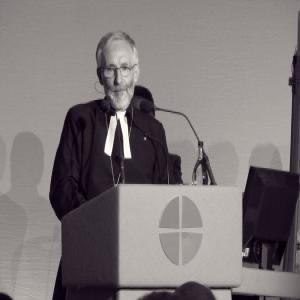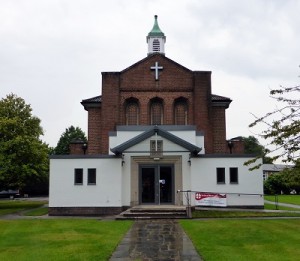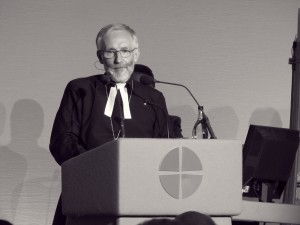Episodes

Monday Nov 09, 2015
08 November 2015 Solihull Baptism, Remembrance, Communion
Monday Nov 09, 2015
Monday Nov 09, 2015
"Blessed are you..."
Bible readings: Psalm 46; Matthew 5:1-12
A Baptism. An Act of Remembrance on Remembrance Sunday. Communion. They are linked together in the experience of blessing. Bringing someone (in this case a child) for baptism is a sign of hope, a commitment to a future with a loving God in response to the fact that God is always with us. "All this for you" we say to the person being baptised "before you could know anything of it". On a wider canvas, the Psalm reminds us of the peace and blessing that comes to us in our daily lives, in society, in the city, in the world when we dwell with the God who is already dwelling with us. Yet when the Psalmists think of how God brings about that peace in the world, they can only do so in terms of a violent, powerful war-lord God who annihilates enemies. In the New Testament we find a deeper understanding demonstrated in the story of Jesus. Jesus is not gentle, meek and mild in the sense of being a "wimp". There is a steel in him. But he is able to absorb into himself all the violence and evil that is around him or that people pour on him, and trusts that God will create order out of chaos, and life out of it - because that is what God is like. The Beatitudes in Matthew's Gospel describe someone living in Jesus's way. They are not just saying that "things might be awful now, but will be reversed in the future". They are saying that the people who mourn, who hunger and thirst for things to be right in the world, who seek to make peace are blessed now whilst they are doing those things - and, by the way, things will be alright in the future as well. So as we remember those who have died as a result of warfare, we remember the death of Jesus; and as we gather round his table, we become one with him in his way of bringing peace, life and hope to the world around us.

Friday Nov 06, 2015
25 Oct 2015 Solihull Dedication of Pastoral Visitors
Friday Nov 06, 2015
Friday Nov 06, 2015
Prayer, Care and Making Disciples
Bible readings: Ephesians 4:7,11-13; Mark 6:30-44
"On our disordered spirits move, and let there now be light" sang Wesley. Is this a place where we can be honest like that about what it is to be human? Some people here are finding life very hard at the moment; some in ways that we know about, and some in ways that we do not. Sometimes we come to church simply seeking to hang in there with our faith, with our lives; looking for ways of getting through the next week, the next day. How as a community do we help and support each other in all that? How does it affect the way we pray, and what we do? The gospel provides some clues. The disciples see a problem, and try to alert Jesus to it. But they are seeking to hand all responsibility over to Jesus and, in effect, demanding a miracle. Jesus, though, hands the responsibility back, calls them to become part of the solution to the problem, and then enables them to do it. He shows them that they are wrong just to see other people (the crowds in this case) as walking bundles of needs, and not notice that the same people already have God-given resources among them. By recognising those resources, offering thanksgiving to God for them, and encouraging the sharing of them, they somehow become sufficient to meet the needs.

Friday Nov 06, 2015
18 October 2015 Warwick Northgate Methodist Church
Friday Nov 06, 2015
Friday Nov 06, 2015
World Church Sunday
Bible readings (including the Gospel for 29th Sunday in Ordinary Time Year B): 1 Corinthians 1: 1-3; Mark 10:35-45
Paul send greetings to the Christians in Corinth encouraging them to grow in holiness. As part of that they have to recognise that they are connected in Christ with people in other places who call on the name of the Lord. Together with people in other places they have to become more Christ-like, seeking to serve and not to be served. What might that mean for the way, for example, we deal with the refugee or migrant "crisis"? We are part of the largest trans-national, trans-cultural organisation in the world. It is not a matter of 'us' and 'them'. In Christ we are all "us".

Thursday Nov 05, 2015
11 October 2015 Coleshill United
Thursday Nov 05, 2015
Thursday Nov 05, 2015
"Facing the darkness"
Bible readings for 28th Sunday in Ordinary Time (Year B): Job 23:1-9, 16-17; Mark 10:17-31
There have been two significant deaths recently in this community. Sometimes it feels as if we can only see death, that we are always looking at disaster, and we do not know how to cope. Sometimes it feels as if God has gone missing. Like Job we would like to be able to put our case to God, to think it out with God. That is what Job feels. But Job does not give up on God, even if he cannot sense God. If God is in the darkness, he will go into the darkness to have the conversation with God. Jesus too knew what it was like to feel that. He cries out "My God, why have you forsaken me?". In Mark's gospel we hear Jesus trying to help people make sense of all this. He wants the man who approaches him to pay attention to God rather than to himself. He wants us to pay attention to what we are holding on to instead of letting ourselves go into the darkness with God. The Christian community can be a surrogate family for people who have lost everything. We will not be released from the hard times, but carried through them.

Thursday Nov 05, 2015
04 Oct 2015 Solihull 9 am Communion
Thursday Nov 05, 2015
Thursday Nov 05, 2015
A hard saying?
Bible reading for the 27th Sunday in Ordinary Time (Year B): Mark 10:2-16
What are we to make of divorce? What did Jesus make of divorce? What is God's hope or intention for human relationships? What provision does God make if we fail to live up to that intention? Does it make a difference if we cease trying to put ourselves in control of everything, and if we cease being judgmental about others: and, instead, experience things like little children. That way, we might be well blessed.

Thursday Nov 05, 2015
27 Sept 2015 Coleshill United Church
Thursday Nov 05, 2015
Thursday Nov 05, 2015
"Staying salty together"
26th Sunday in Ordinary Time. Bible readings: Psalm 19; Mark 9:38-50
What does it mean if people who have always exercised power over us ask for our forgiveness? Is it possible to forgive people for what their predecessors did to ours? But if we cannot forgive are we not allowing ourselves to be trapped in our history and our past? Yet if we do forgive what happens to our own sense of identity which we so often define in terms of who and what we are against, and according to attitudes about others that we have inherited? Jesus told us not to ignore or prevent people from working for God's kingdom simply because they did not belong to 'our gang' or would not do what we tell them. We should be worried about our own holiness, not that of others. Otherwise we cease to be salt that seasons the world.

Thursday Nov 05, 2015
20 September 2015 Shirley
Thursday Nov 05, 2015
Thursday Nov 05, 2015
"Being the last of all and the servant of all"
Bible readings for the 25th Sunday in Ordinary Time (Year B): James 3:13 - 4:3, 7-8a(NRSV); Mark 9:30-37
Over the years the Troubles in Ireland have been attributed to disputes between Roman Catholics and Protestants, even when matters of faith do not seem to have been the point of dispute. More recently there slowly appears to have been progress towards living more in peace. In Italy, Pope Francis has recently asked for forgiveness for the ways in which the Roman Catholic Church has treated the Waldensians for over eight centuries. In British history, Catholics and Protestants have brutally executed each other in order to uphold their own understanding of faith. More recently we have perhaps come to see that whereas killing people for an understanding of faith is always wrong, being prepared to die for it provides a powerful witness; and we might therefore find common cause with our former 'enemies' in a shared experience and understanding of martyrdom. Why is it that people of Christian (and other faith) are able to profess a God of love, mercy, peace and unity, and still separate themselves from others, and treat them viciously and cruelly? It is an expression of the human condition which we all share (what we might call original sin). Yet if we open ourselves to the love of God shown in Christ, God is able to start to transform the mess of our lives. We may then start to become more like the little child of whom Jesus spoke, acting as the last and the servant of all. if we start to live in that way, we shall have something to offer the fractured world.

Monday Sep 14, 2015
13 Sept 2015 Solihull Rededication
Monday Sep 14, 2015
Monday Sep 14, 2015

A sermon at the Re-dedication of Solihull Methodist Church following a refurbishment of the sanctuary.
Bible readings: 1 Kings 8:22-30; Luke 4:16-21.
What a wonderful space! What a magnificent achievement! We rightly echo the words of Solomon. But like Solomon we have inherited the project from those who have gone before us. Our Church (buildings and people) is being refreshed to serve the present age. We Methodists are perhaps more comfortable thinking of ourselves as a tabernacling people than as a temple people, but we too have to resist the temptation of making the things that point us towards God more important than the God to which they point. When we worship and express our love for God we find ourselves being drawn into loving what God loves - the whole world and the people in it. Jesus said that when the Word of God about releasing people from all that oppresses them and clouds their vision was read and he was there, it became real. He is with us when we read the Word, and it must become real through us, his body in the world. So we dedicate our building and ourselves as we seek to worship and serve God in the future. We praise God for all that is past; and trust God for all that's to come.

Monday Apr 16, 2012
PSA 15 April 2012 Second Sunday of Easter
Monday Apr 16, 2012
Monday Apr 16, 2012
Ken Howcroft “My Lord and my God!”. Today is a time to
reflect on the significance of the great events we celebrated last Sunday. Is
it easier for us to cope with the events of that first Easter than it was for
those first disciples or more difficult? They must have been overwhelmed by
what was happening and incredibly confused. Thomas is our link to them. He was
not physically there when Jesus first appeared to the others, but he arrives at
the deepest understanding of what is happening in the resurrection and of who Jesus
is. John’s Gospel has Jesus speaking to Thomas but it is as if he is looking
over Thomas’s head at you and me and saying “Blessed are those who have not
seen and yet have believed.” That is you and me. We did not physically see him
before he was crucified. The resurrection appearances as recounted in the
gospels came to an end with Pentecost. We meet him now but not in the same way.
Blessed are you who have not seen him like Peter and Mary and the others, and
yet have believed – and have started to act on that belief, sharing his
self-giving love in the world. A sermon for the second Sunday of Easter. The
readings were Acts 4:32-35 and John 20:19-31.

Tuesday Apr 10, 2012
PSA 08 April 2012 Easter Sunday and Confirmation
Tuesday Apr 10, 2012
Tuesday Apr 10, 2012
Ken Howcroft. “Christ is Risen!”. Why have we come here
today? What are we looking for? If you are looking for irrefutable evidence
that Jesus has been raised which will enable you to say “Oh thank goodness for
that, now I know that it is true” and then enable you to walk out of this place
and then live the rest of your life just like you did before, you are going to
be sadly disappointed. The resurrection
is not something that you can argue people into believing. The early
Christians experienced it as true. The Easter message they pass on to us
is a call to follow Jesus, to say the sort of thing he said and do the sort of
thing he did; to be his body in the world. It is then that we shall know him.
We are called not to believe 600 impossible things and strange doctrines before
breakfast but to commit ourselves with all our weaknesses and failings to follow
Jesus as best we can, knowing that as we do he will be with us and that he is
risen indeed! A sermon for Easter Sunday, when two members of the congregation
were confirmed. The readings were 1 Corinthians 15:3-8 and Mark 16:1-8.

